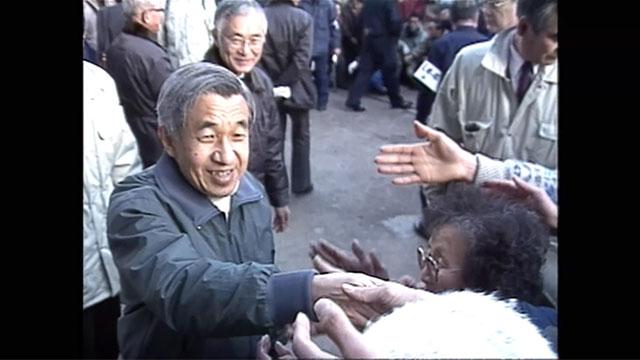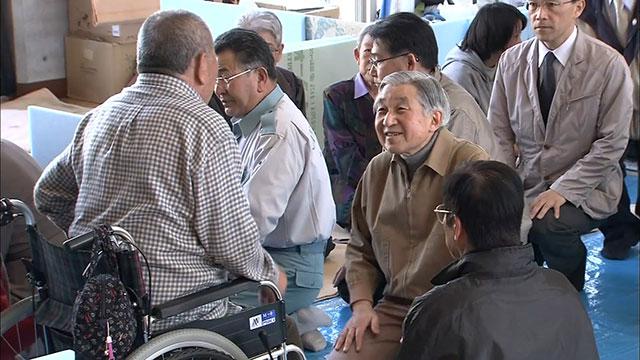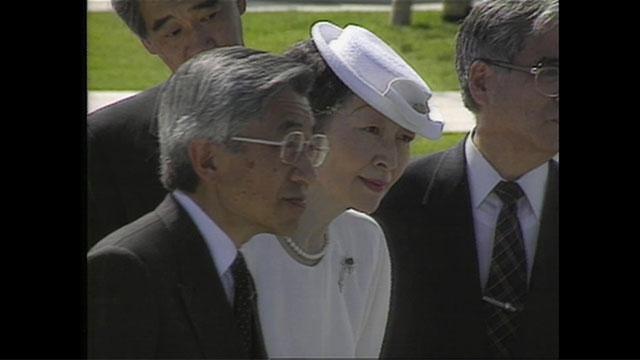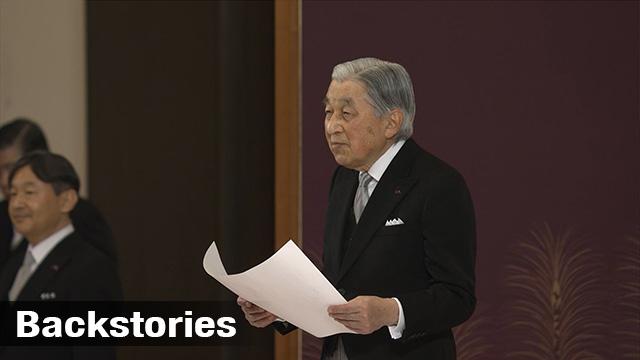"Since ascending the throne 30 years ago, I have performed my duties as the Emperor with a deep sense of trust in and respect for the people, and I consider myself most fortunate to have been able to do so. I sincerely thank the people who accepted and supported me in my role as the symbol of the State.
I sincerely wish, together with the Empress, that the Reiwa era, which begins tomorrow, will be a stable and fruitful one, and I pray, with all my heart, for peace and happiness for all the people in Japan and around the world."
The abdication ceremony -- the "Taiirei-Seiden-no-gi" --was held in the State Room in the Imperial Palace.
Earlier in the morning, the Emperor went to the Imperial Palace Sanctuaries to pay respects to the Sun Goddess, the souls of his ancestors, and various deities.
The Emperor read out a script written in ancient Japanese to inform them of his abdication.
The abdication ceremony was held in the State Room in the Imperial Palace in the evening. Emperor Akihito entered the room behind senior officials of the Imperial Household Agency.
Chamberlains followed carrying the Imperial Regalia, a sacred sword and jewel that are proof of enthronement as Japan's Emperor. The State and Privy Seals were also brought in. Other members of the Imperial family were in attendance. They included Empress Michiko; Crown Prince Naruhito and Crown Princess Masako; and Prince and Princess Akishino.
About 300 other people attended the ceremony, including Prime Minister Shinzo Abe, the heads of both chambers of the Diet, the Chief Justice of the Supreme Court, and local government leaders.
Before the Emperor gave his speech, Prime Minister Shinzo Abe spoke on behalf of the people of Japan.
The Prime Minister said, "We will keep in our minds the steps Your Majesty has taken to this point and continue to do our utmost to make Japan a country which is peaceful, full of hope, and one we can be proud of. We sincerely hope for the long and healthy lives of Your Majesties the Emperor and Empress."
Emperor Akihito went to the Imperial Palace Sanctuaries to pay respects to the Sun Goddess, the souls of his ancestors, and various deities.
People across Japan expressed their thoughts about Emperor Akihito and Empress Michiko.
Noriyuki Kazaoka was the head of the Imperial Household Agency when the Emperor expressed a desire to step down three years ago.
Kazaoka said he is full of respect and gratitude for the Emperor and Empress Michiko. He wished them calm and relaxing days ahead. He said the Emperor and Empress stood by the Japanese people on various occasions, and that their interactions with the public created a sense of togetherness.
People in the city of Kobe spoke of their gratitude. The Emperor and Empress visited the city two weeks after the area was hit by the Great Hanshin Earthquake in 1995.
At one burnt-out site, the Empress laid narcissus flowers she picked at the Imperial Palace. The site later became a park with narcissus flowerbeds.
Yasue Kobata, who has taken care of the flowers, said the narcissus were a precious and heartfelt gift from the Empress. Tomokazu Matuyama, the head of the park's management group, said he will make sure the flowers keep blooming.

Narumi Abe owns a tile workshop, and she met the Emperor and Empress when they visited Onagawa Town in Miyagi Prefecture three years ago. The town was devastated by the 2011 earthquake and tsunami.
Abe said words from the Empress gave her the courage to move on. She said the Emperor and Empress always showed concern for people in grief after a tragedy struck in Japan.

Naeko Teruya is a former leader of an association of war-bereaved families in Okinawa Prefecture. She lost five family members during the closing days of World War Two. She has met the Emperor and Empress five times, including when they were the Crown Prince and Princess.
Teruya said she had mixed feelings at first because she lost her father in the war and saw her mother struggle. But she said she is now filled with gratitude as she was able to sense the Emperor and Empress' sincere consideration for Okinawa and strong wish for peace.

Emperor Akihito is Japan's 125th Emperor. This is the first time in over 200 years that a living Emperor in Japan abdicated.
The Imperial Household Agency says Emperor Akihito will hold the title "Joko" after abdication, an abbreviated title meaning "grand emperor." His English title will be "Emperor Emeritus."
On May 1, Crown Prince Naruhito will ascend the throne as Emperor.

